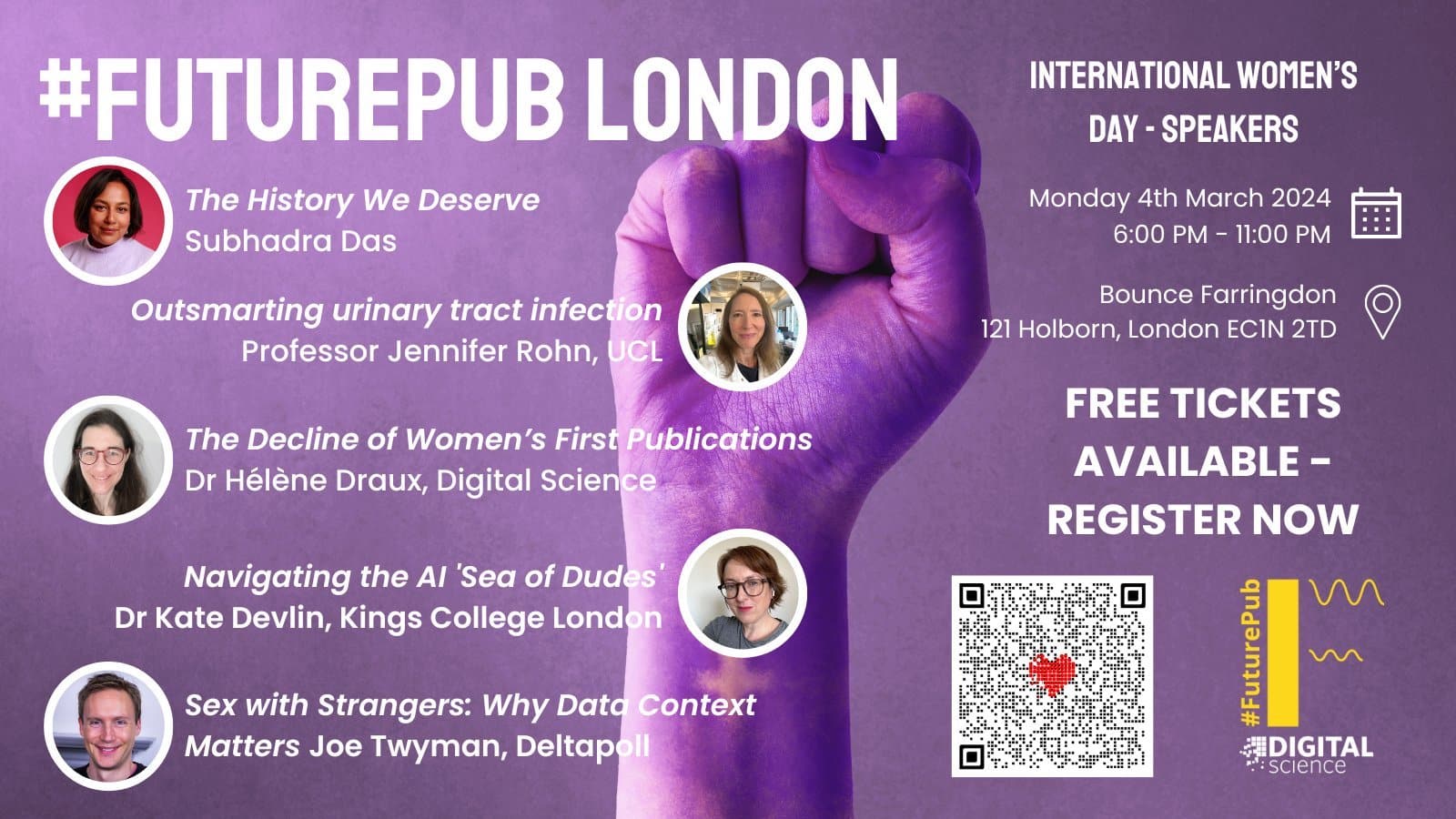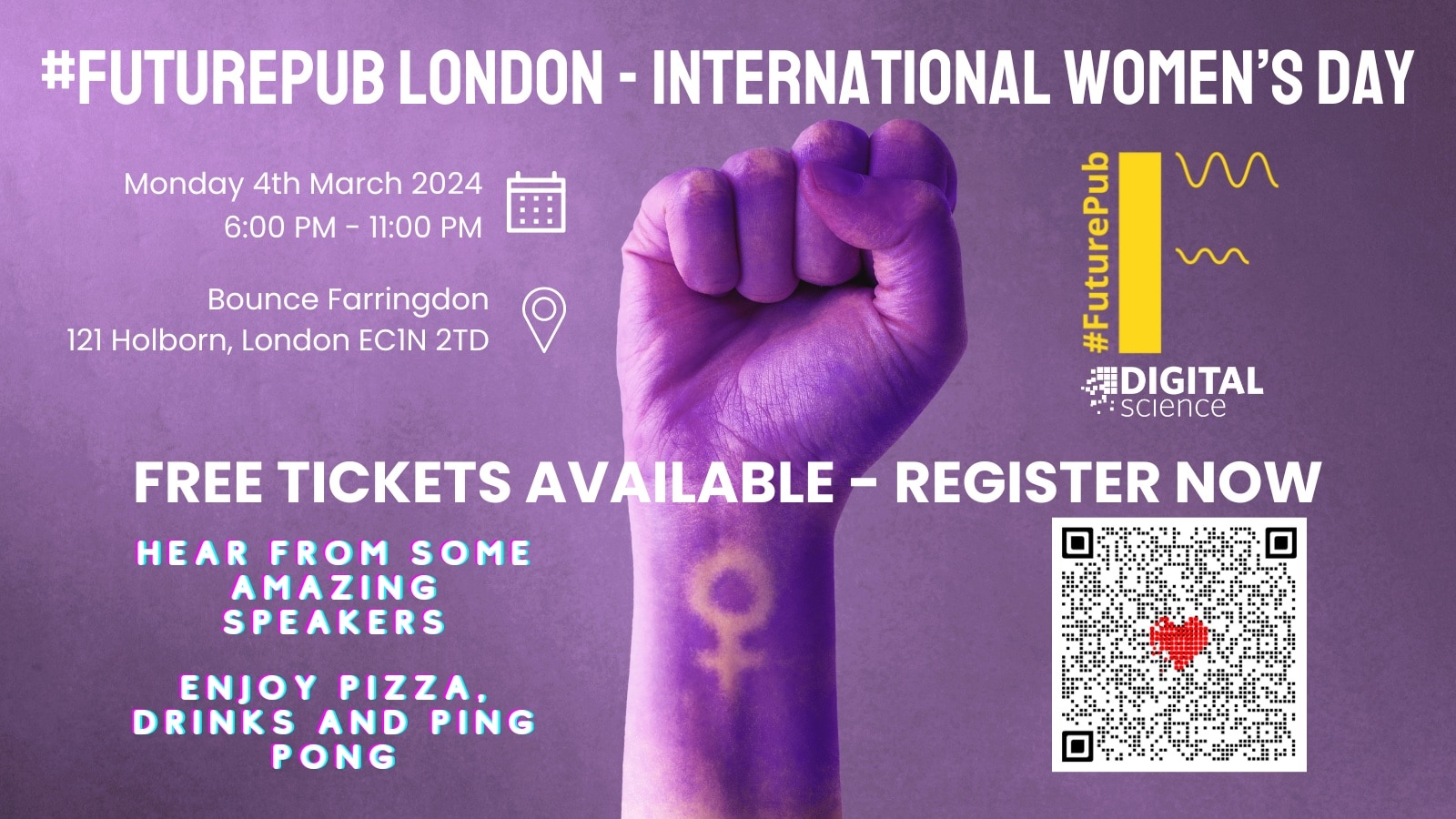#FuturePub London – International Women’s Day 2024
Food, drink, lightning talks, and ping pong tournaments!
#FuturePub is back in London for our first event of 2024 and, by popular demand, we are thrilled to be hosting this at the awesome ping ping club Bounce in Farringdon once again!
The focus of this FuturePub is to create a platform for conversation around inclusion, from gender imbalance in research and tech to intersectional challenges faced by people across the world, and how a more diverse research workforce and tech designed with everyone in mind will ultimately lead us through some of the challenges we face as a global society and towards a better quality of life for all.
See the speakers for this event (details below):

What is FuturePub and how does it work?
We’ve hosted over a dozen #FuturePub events, since our first back in January 2014, and quickly became known as “a staple of the London science tech/publishing scene” (thanks Eva!).
The evenings are designed to be fun and informal – we aim to give opportunities to those working on new ideas and innovations a chance to present and get feedback on their ideas. And did we mention the free food and drink?
In case this is your first time, here’s how it works:
- Five or six quick-fire talks cover a range of new and exciting developments in science and publishing technology
- These all fit into a one-hour slot (from around 7 pm to 8 pm) to keep the evening fast-paced and fun. Arrive from 6 pm for pre-talk food and drinks and to play a few games of ping pong or shuffleboard
- The rest of the evening is open for discussions and conversations over the remainder of the drinks and food. We get a great mixture of attendees from the research, tech, publishing and start-up communities, so there will be plenty of people to meet and chat with, especially around such an exciting topic.
Timings for the evening
Here’s the confirmed schedule for 4th March:
- 6 pm – doors open, drinks available, and opportunities to play ping pong or shuffleboard
- 6:30 pm – food served (a selection of bite-sized starters and heaps of pizza, with vegetarian, vegan and gluten-free options available)
- 7 pm – Lightning Talks start
- 8 pm – Lightning Talks end, remaining food to be consumed, ping ping duels to be thrown down
- 8:30 pm – food cleared, drinks still available for the continuing conversations
- 11 pm – that’s a wrap! Though if you would like to continue conversations, you are welcome to find a nearby pub. Just let us know which one you’re going to. Suze will have a whisky-ginger-generous squeeze of lime please.
Speakers & Talks
Subhadra Das – The History We Deserve
I’ll be telling the story of Edward Drinker Cope, a nineteenth-century American scientist whose research ran the gamut from dinosaur hunting to false notions of the sex binary and what it means to be civilised. I’ll be considering how this highly influential but relatively lesser-known figure in the history of science left a legacy we need to be mindful of today in the interests of greater social justice.
Subhadra Das is a writer, historian, broadcaster and comedian who looks at the relationship between science and society. She specialises in the history and philosophy of science, particularly the history of scientific racism and eugenics. For nine years she was Curator of the Science Collections at University College London. She has written and presented podcasts and stand-up comedy shows, curated museum exhibitions, and has appeared on radio and TV. Her first book Uncivilised: Ten Lies That Made The West is out now.
Dr Hélène Draux – Digital Science – What The Decline in Women’s First Publications Means For Research
Despite past progress, including women in the US surpassing men in doctoral degree attainment, the COVID-19 pandemic has disproportionately affected women, potentially halting or reversing their academic advancements. Based on data from dimensions.ai and Gender API, we explore the trend from 2000 onwards, noting a significant drop in women’s first publications in recent years. This presentation highlights the importance of recognising and addressing the systemic challenges faced by women in academia, emphasising a call to action for institutions and funders to support and retain women in research, ensuring their contributions continue to enrich and diversify the field.
Dr Hélène Draux is a Senior Data Scientist at Digital Science. She creates bespoke bibliometrics analyses and visualisations for clients in the research sector, using data from the Digital Science portfolio (e.g. Dimensions, Altmetric, Figshare, Elements, IFI Claims, and GRID), clients’ data and external data. Her specialties include gender analyses, geographic analyses, topic modelling, network analyses, and interactive visualisations. She has published a book chapter on Visualisation of Research Metrics, her work was featured in Nature, and during the pandemic she has published a peer reviewed article about the speed of publishing and gender differences in publication.
Professor Jennifer Rohn – UCL – Outsmarting urinary tract infection
Urinary tract infections (UTI) affect a staggering 400 million people each year, and the gold-standard treatment, oral antibiotics, often fails. This is because the bacteria which cause UTI have clever ways of evading antibiotics, but therapy innovations in this “mostly women” disease space have been hampered by lack of interest, urgency and research funding. In this talk, you’ll learn more about how bacteria hide from drug attack, and one possible solution to get around it.
Professor Jennifer Rohn is a research group leader in the Division of Medicine at University College London, and the Head of the Centre for Urological Biology. Her team studies the biology of urinary tract infections (UTI) and seeks to develop new cures for treatment-resistant and chronic UTIs. She works in cross-disciplinary collaborations with clinicians, engineers and materials scientists, and her research interests include cell biology, microbiology, antimicrobial resistance, immunology, tissue engineering, and the development of novel therapies and human cell-based model platforms. She is also a novelist, journalist, public speaker, science communicator and pundit.
Joe Twyman – Deltapoll – Sex with Strangers: Why Data Context Matters
A research study from the 1970s became a definitive work on the differences in sexual behaviour between men and women. The study was so significant it inspired a dance hit in the 1990s that made the top ten across Europe. But all was not as it seems…
One of Britain’s best known political pollsters, Joe Twyman is Co-Founder and Director of the global public opinion consultancy Deltapoll and is a pioneer of using the internet for conducting opinion research. Previously he was a director at the founding of YouGov back in 2000, holding a variety of senior positions within that company and was responsible for building their online research operations. He also spent two and a half years in Baghdad as a director of YouGov’s Iraq operation from 2007 to 2010. He has published a number of academic research papers, worked as project director for five British Election Studies and frequently provides expert analysis for TV, radio and newspapers both at home and abroad. You can find him on twitter @joetwyman.
Dr Kate Devlin – King’s College London – Navigating the AI ‘Sea of Dudes’
In 2016, computer scientist Margaret Mitchell described AI as a “sea of dudes”. What has the discipline done in that time to improve things and make it fairer and more representative of the world? Hahaha. Nothing. This is 5 minutes on the lack of – and need for – women in AI. (Yes, we know and celebrate Ada Lovelace. No, that doesn’t fix things.)
Dr Kate Devlin is Reader in AI & Society at King’s College London, and is a co-investigator on the Responsible AI UK programme – a network that conducts and funds research into AI to benefit people, communities and society and that unites the responsible AI ecosystem in the UK and beyond. She also does work on sex robots but for once she’s not talking about that.
Don’t forget to register!
Tickets are limited, so please don’t forget to sign up, and feel free to share this event with your friends that would like to attend and possibly even speak at this or future events.
See you on 4th March at Bounce in Farringdon!







